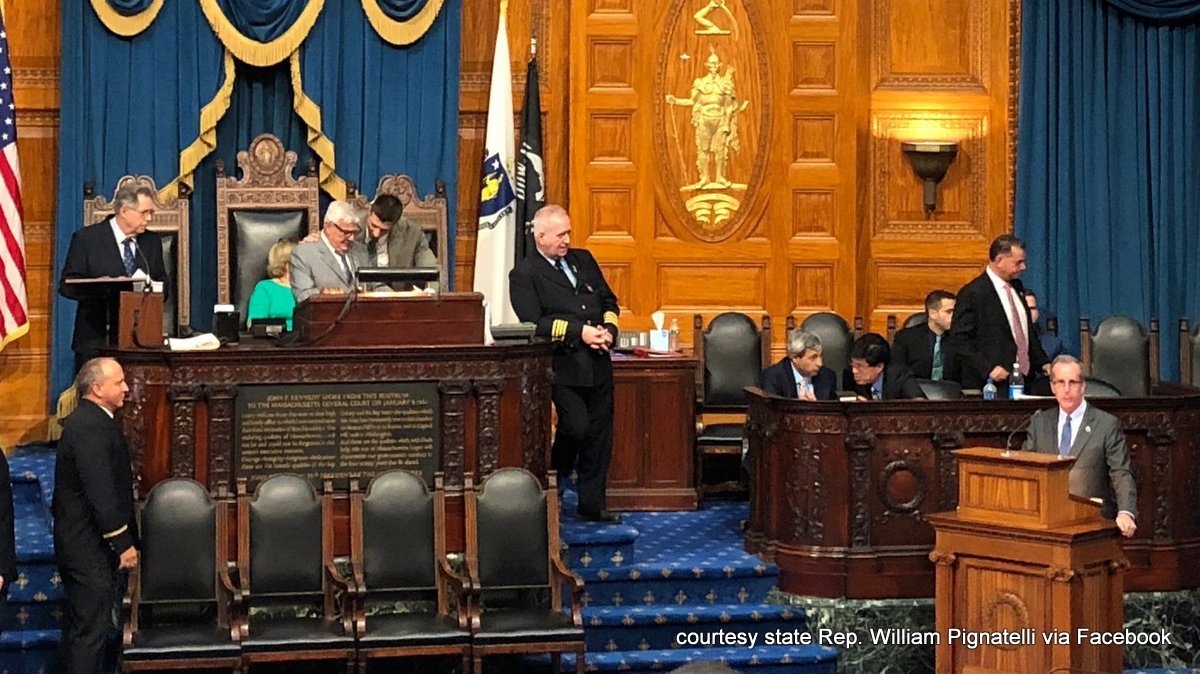House, Senate Pass Bond Bill With Funds for Greylock Glen| 04:58PM / Tuesday, July 31, 2018 | |
 State Rep. Smitty Pignatelli speaking on behalf of the environmental bond bill on Friday. State Rep. Smitty Pignatelli speaking on behalf of the environmental bond bill on Friday. |
BOSTON — Both the House and Senate have passed a $2.4 billion environmental bond bill that is focused on improving climate change resiliency and adaptation, enhancing environmental and natural resource protection, and investing in parks and recreational assets.
The bill now heads to the governor's desk and awaits his signature.
It includes some $2.3 million toward the development of the Greylock Glen, which envisions an outdoor center, lodge and campground; $1.5 million toward water conservation and stormwater runoff infrastructure at Tanglewood and $300,000 for improvements at Kennedy Park, both in Lenox; $400,000 to the Great Barrington Land Conservancy and W.E.B. Dubois River Garden Park, and no less than $1 million for cleanup of the New England Log Homes site; $1 million for removal of hazardous waste and drainage improvements at the old Dalton High School; $30,000 for a study on eradicating zebra mussels at Laurel Lake in Lee and another $800,000 for accessibility improvements at the lake; $500,000 for flood and drainage improvements at the Skyline Trail in Hinsdale; and $5 million for repairs and improvements to culverts along Route 57 in the towns of Sandisfield, Monterey, and New Marlborough.
State Rep. William "Smitty" Pignatelli, as chairman for the Joint Committee on the Environment, Natural Resources, and Agriculture, served on a conference committee comprised of members of both houses who debated on what policy issues would end up in the final version of the bill.
Some of the spending appropriated in the bill includes:
-
$225,000,000 for community investment grants;
-
$100,000,000 for energy and environment coastal infrastructure;
-
$100,000,000 for state hazard mitigation, climate adaptation, and resilient land conservation;
-
$75,000,000 for municipal vulnerability preparedness;
-
$55,000,000 for river and wetland restoration programs;
-
$54,000,000 for rural investments.
"I am proud to say this bill is an amazing example of bipartisan effort and compromise," said Pignatelli in a statement. "I'm grateful to Speaker [Robert] DeLeo for including me in this conference process, and to my colleague, Rep. [David] Nangle, for his leadership and understanding while we championed the issues we believed were most necessary for the environmental benefit of the commonwealth.
"I understand neither side got everything it wanted out of the compromise, but I believe we've come out with a strong bond bill that funds necessary environmental investments across the state, including an agricultural estate tax credit, integrated state climate adaptation plans, and an investment in preserving our cities and towns. This bond bill aims to preserve our land, restore dams and seawalls, and support various community investment grants which will all have lasting effects on our communities."
Nangle, of Lowell, the House Conference Committee chairman, said the final report of the conference committee represented a bill that ensures Massachusetts remains a national leader in environmental protection.
"I was very pleased with the hard work and collaboration put forth by my colleagues in the House and Senate in crafting an important environmental bond bill," said Nangle. "There were some significant differences between the House and Senate versions of this bill, but after several sessions, we finalized a bill that includes funding for hundreds of worthy projects across the state."
On Friday, Pignatelli spoke on floor of the House of Representatives championing the bill's bipartisan effort and its aim to improve all local cities and towns across the commonwealth.
"This bill ensures that Massachusetts invests back into our local communities," he said. "Our bill is an investment back into our parks, our trails, our forests, and our rural areas where farmers help grow and cultivate our agricultural economy."
Besides the funding appropriated to support all local earmarks in the bill, this piece of legislation highlights many outside sections, including the creation of a Global Warming Solutions Trust Fund. The fund will allow for the implementation of the Global Warming Solutions Act, the state's Clean Energy and Climate Plan, and state and local strategies for climate adaptation.
Other highlights of the bill include the creation of the Agricultural Estate Tax, which aims to ensure a thriving agricultural economy here in Massachusetts by making it more affordable for future generations to continue farming, instead of selling off the land for development; the creation of the Agricultural Innovation Fund to finance grants for the commonwealth's agricultural and cranberry producers; and the Fishing Innovation Fund for the design, construction, and modification of commercial fishing vessels.
Gov. Charlie Baker has 10 days to sign the 2018 Environmental Bond Bill into law.
|

 MEMBER SIGN IN
MEMBER SIGN IN
 MEMBER SIGN IN
MEMBER SIGN IN